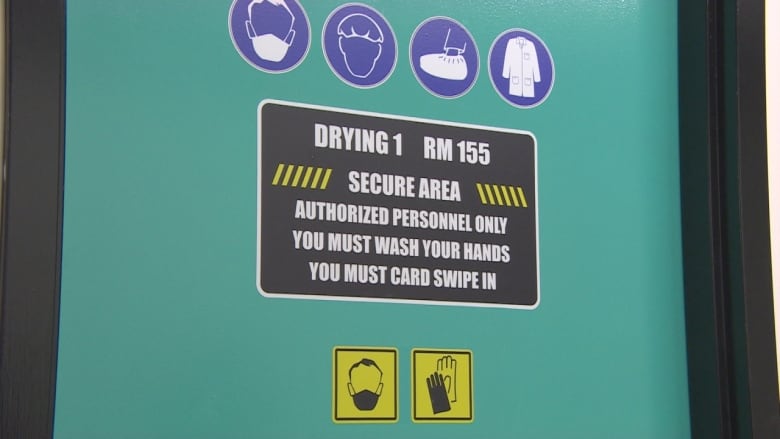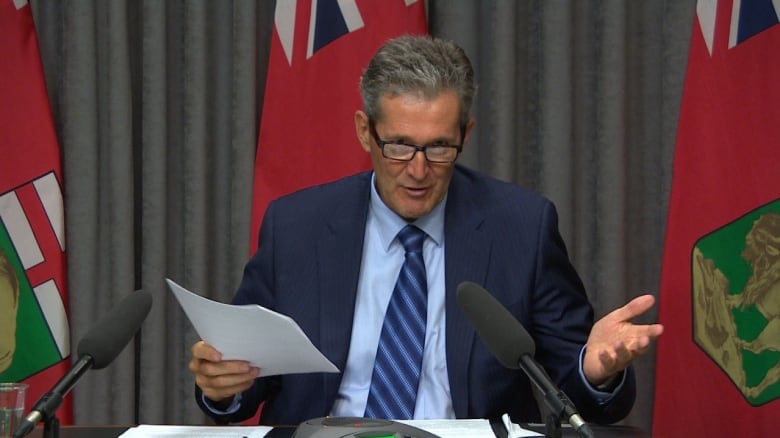Origin of Bonify's unlicensed pot still unknown, but companies working on ways to track cannabis
New technology could track cannabis from seed to sale, companies say as Health Canada reviews Bonify

Health Canada is continuing its review into how 200 kilograms of unlicensed cannabis found its way into Bonify's vaults, and the RCMP say they're "assessing" the situation.
Meanwhile, some in the cannabis industry believe if the government is serious about stamping out illicit, unauthorized or illegal marijuana, it has to be tracked from seed to consumer — and they're working on technology to do that.
In December, Bonify — a Winnipeg-based cannabis producer — said three of its executives had been dismissed, and it had hired RavenQuest BioMed to take over operations on a temporary basis.
That announcement followed two Health Canada recalls of Bonify products in December. The province of Manitoba also suspended the sale and distribution of all Bonify products last month.
Bonify voluntarily chose to suspend all retail sales in Saskatchewan and is no longer selling medicinal cannabis, as the company tries to restore regulators' confidence, said RavenQuest CEO George Robinson in December.
A number of front-line staff tried to speak out about 200 kilograms of unlicensed cannabis that arrived at Bonify's Winnipeg production facility, he said, but were pressured to look the other way.
He also confirmed at that point that the recalled product was unauthorized, containing traces of bacteria, yeast, mould and the unconfirmed presence of E. coli. He did not, however, call the products "illegal" or "illicit."

But so far no one can, or will, say how the 200 kilograms of pot got into the facility or where it was originally grown — despite an extensive video surveillance system in place at Bonify's production facility and what Health Canada asserts is "stringent requirements around physical and personnel security, record keeping, inventory controls and reporting" in its own tracking system.
A spokesperson for RavenQuest said this week that because the investigation is still ongoing, the company "is unable to provide any additional comments at this time."
Meanwhile, Manitoba Premier Brian Pallister referred to "illegal" Bonify product in December, and his government expects the federal government and Health Canada to "assure the quality and safety of legal cannabis products" sold to customers.
Law enforcement has remained mostly quiet about their role in Bonify's unaccounted-for cannabis. Health Canada will only say "local law enforcement is aware of this situation."

After repeated requests to the RCMP, the service provided a brief statement to CBC News.
It said the Mounties are "assisting" and "assessing" the situation — but didn't go as far as calling it an investigation.
"The RCMP is presently assisting the province of Manitoba by assessing the information obtained to date with respect to the Bonify matter," Manitoba RCMP media relations officer Tara Seel wrote in an email to CBC News.
"The RCMP will conduct a review of this information and will determine the scope of a subsequent investigation, if any, upon completion of the review."
Health Canada is the lead agency assuring Canadians are consuming legal and safe marijuana.
The department maintains a Cannabis Tracking and Licensing System that requires monthly reports from the holders of licences for cultivation, processing, or sale for medical purposes.
It was, however, an email complaint in late November to Health Canada — not the tracking system — that started a review of what was going on inside Bonify.
Cannabis-tracking technology
Ensuring cannabis products are free from contaminants and are consistent for consumers has become the holy grail for one B.C.-based company.
Blockstrain Technology Corp. says it's developed a system where the genetics of the plant are recorded on encrypted blockchain technology to create a registry of the product that can't be altered.
"So what we said was OK, in order for any of this system to work we have to be able to identify that product at its source," Blockstrain CEO Robert Galarza told CBC News.
Several companies have been developing types of monitoring systems for the plant, but Blockstrain appears to be ahead of its competitors.

Galarza says any comprehensive tracking system for the tons of cannabis being produced has to start with ending the practice of logging product by the name of the strain of marijuana under which it is grown and sold.
According to Galarza, product names such as Blue Dream, Gorilla Glue, Maui Wowie are just that — names.
"Strain names are complete bullshit and they need to be eliminated from the process of inventory," he said.
"Strain names mean nothing, and really mean nothing, because they are made up. They are made up by the producers. They are made up by the dealers."
At some point somebody is going to have to step up and say … moving forward, if I want to really be able to eliminate black-market product, I first have to identify legal product.- Blockstrain CEO Robert Galarza
Blockstrain's approach to identifying each type of cannabis strain goes far deeper than a name.
"We were able to marry our system to genomic principles of genetic identification," Galarza told CBC News.
"So now we can identify the pure genetics of the source material down to their their entire sequence.… We can rapidly do a full whole genome sequence identification registry of strain — a realistic registry."
Galarza, and some others in the industry, believe tracking is vital to stopping the movement of illicit cannabis.
"At some point somebody is going to have to step up and say … moving forward, if I want to really be able to eliminate black-market product, I first have to identify legal product," he said.
"If I don't have any ability against a legal product, then how do I have any chance to be able to make sure the product [that] is … illegal is not in my stores and not my shelves?"
'It's the way to keep everybody honest'
Blockstrain caught the attention of the principals at WeedMD, a federally licensed producer and distributor of cannabis and cannabis oil for both medical and recreational use.
The Ontario-based company has 136,000 square feet of growing facilities in that province, and expects to expand to a half million this year.
The company's lead grower and partner, Derek Pedro, saw Blockstrain as the way to absolutely assure customers of the origin of cannabis products — not only for his company, but for the entire industry.
WeedMD has registered 40 out of hundreds of its proprietary strains with Blockstrain.
"It is the only true system out there," said Pedro. "It's the way to keep everybody honest."
You cannot regulate something you can't control. And this is, under the licensed-producer system, the only way to really control cannabis.- Derek Pedro, WeedMD
He says the current Health Canada tracking is as robust as it can be and growers are followed every minute by video cameras in their production facilities, but he believes RavenQuest's George Robinson was being honest when he told the media he didn't know where Bonify's unlicensed 200 kilograms of cannabis came from.
But Pedro says true genomic testing of all the product is needed — not only to get rid of the black market sources of cannabis, but to control quality as well.
"You cannot regulate something you can't control. And this is, under the licensed-producer system, the only way to really control cannabis."
The tests, he says, can be completed in a couple of weeks and for a cost of a few hundred dollars.
Health Canada did not answer questions from CBC News whether it was considering adding genomic identification to future versions of its Cannabis Tracking and Licensing System.
With files from Ian Froese


